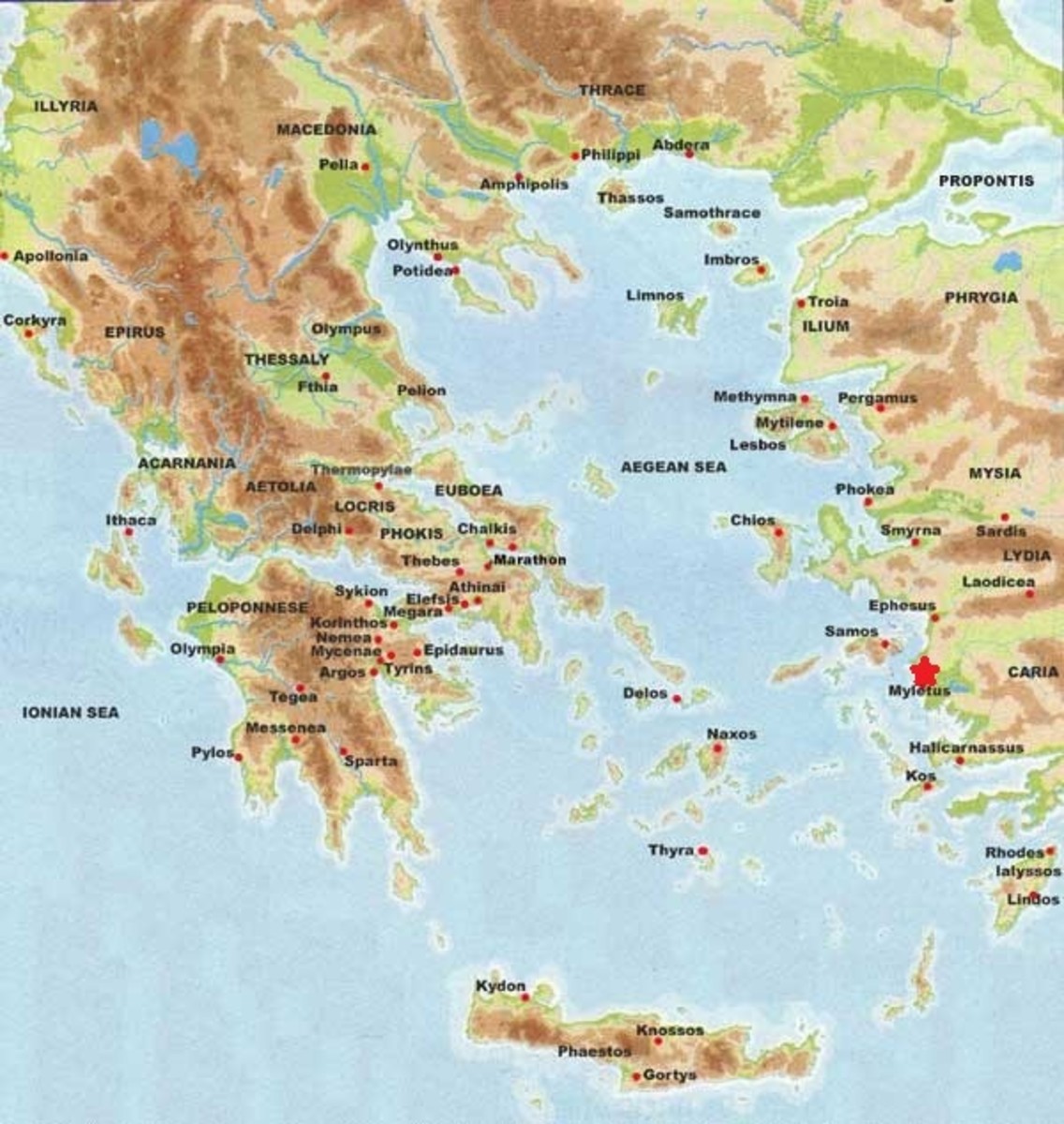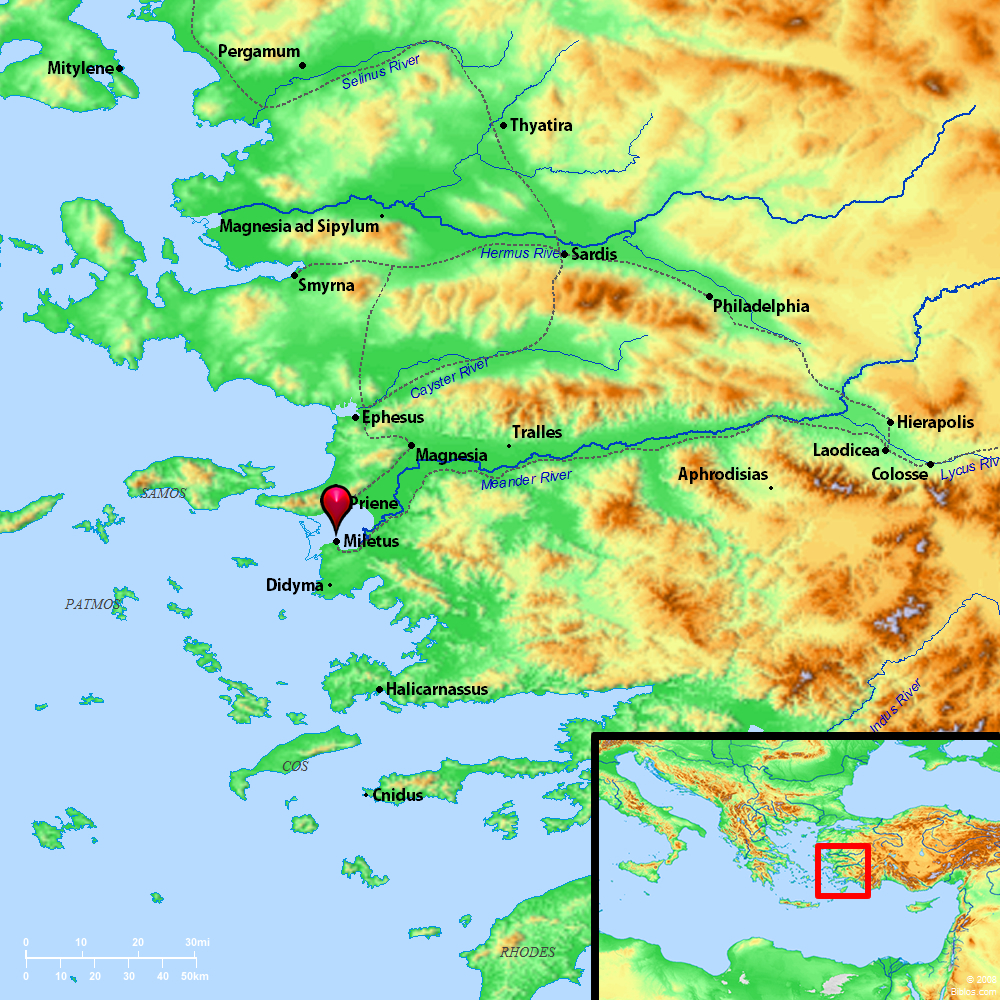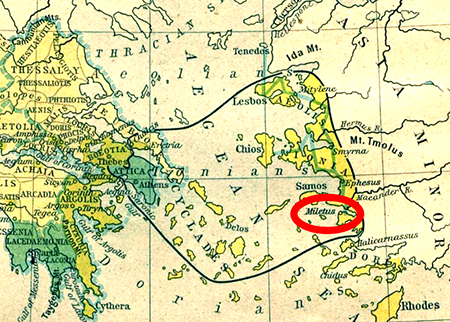Miletus: A Map of Ancient Greek Innovation and Influence
Related Articles: Miletus: A Map of Ancient Greek Innovation and Influence
Introduction
With enthusiasm, let’s navigate through the intriguing topic related to Miletus: A Map of Ancient Greek Innovation and Influence. Let’s weave interesting information and offer fresh perspectives to the readers.
Table of Content
Miletus: A Map of Ancient Greek Innovation and Influence

The ancient city of Miletus, nestled on the Aegean coast of what is now Turkey, was a vibrant hub of trade, culture, and intellectual thought. Its influence extended far beyond its geographic boundaries, shaping the course of Western civilization. Understanding Miletus requires more than just a map; it demands delving into its complex history, its contributions to philosophy, science, and art, and its enduring legacy.
Miletus: A Strategic Location and a Flourishing Center
Miletus’ strategic location at the mouth of the Maeander River, overlooking the Aegean Sea, played a pivotal role in its rise to prominence. This strategic position facilitated trade with the East and West, making it a major maritime power. The city’s wealth derived from its bustling port, which served as a conduit for goods from across the Mediterranean. This economic prosperity provided the foundation for Miletus’ intellectual and cultural flourishing.
A City of Firsts: Innovation and Influence
Miletus became renowned for its contributions to various fields, earning the title of "the mother city of the Greek world." Its innovations and achievements left an indelible mark on Western civilization.
-
The Birthplace of Philosophy: Miletus gave birth to the first Western philosophers, known as the Milesian School. Thales, Anaximander, and Anaximenes, all hailing from Miletus, challenged traditional mythology and sought to explain the universe through rational inquiry. Their emphasis on observation and logic laid the groundwork for the development of Western philosophical thought.
-
Advances in Science and Technology: The Milesians were pioneers in various scientific fields. Thales is credited with predicting a solar eclipse, while Anaximander developed the first known map of the world and proposed the theory of evolution. Miletus also played a crucial role in the development of navigation, shipbuilding, and engineering.
-
The Legacy of Architecture and Art: Miletus boasted impressive architecture, including the magnificent Temple of Artemis, one of the Seven Wonders of the Ancient World. The city also produced renowned artists and sculptors, whose works influenced later generations.
Miletus: A City in Decline and a Lasting Legacy
Despite its remarkable achievements, Miletus faced challenges. Political instability, conflicts with neighboring empires, and the changing tides of power led to its decline. By the time of the Roman Empire, Miletus had lost its former glory.
However, the legacy of Miletus endures. Its contributions to philosophy, science, and culture continue to inspire and inform us today. The city’s remarkable story serves as a testament to the power of human ingenuity, the importance of intellectual curiosity, and the enduring influence of a vibrant and innovative civilization.
FAQs about Miletus:
- What was the primary source of Miletus’ wealth?
Miletus’ wealth stemmed primarily from its flourishing trade network. Its strategic location at the mouth of the Maeander River and its access to the Aegean Sea made it a major maritime hub, facilitating the exchange of goods with the East and West.
- Who were the most famous philosophers from Miletus?
The most renowned philosophers from Miletus were Thales, Anaximander, and Anaximenes, collectively known as the Milesian School. Their pioneering work in rational inquiry and natural philosophy laid the groundwork for Western philosophical thought.
- What were some of the scientific advancements attributed to Miletus?
Miletus played a significant role in the development of various scientific fields. Thales’ prediction of a solar eclipse, Anaximander’s map of the world and theory of evolution, and the city’s contributions to navigation, shipbuilding, and engineering demonstrate its scientific prowess.
- What happened to Miletus?
Miletus faced a decline due to political instability, conflicts with neighboring empires, and the changing tides of power. By the time of the Roman Empire, it had lost its former glory.
- What is the significance of Miletus today?
Despite its decline, Miletus’ legacy endures. Its contributions to philosophy, science, and culture continue to inspire and inform us today. The city’s story serves as a testament to the power of human ingenuity and the enduring influence of a vibrant civilization.
Tips for Exploring Miletus:
-
Visit the ruins: The remains of ancient Miletus are a UNESCO World Heritage Site and offer a glimpse into its past grandeur. Explore the ruins of the Temple of Artemis, the agora, and the theater, imagining the bustling city that once stood there.
-
Learn about the Milesian School: Delve into the writings of Thales, Anaximander, and Anaximenes to understand their pioneering philosophical ideas. Their contributions laid the foundation for Western thought.
-
Discover the city’s connection to the Aegean Sea: Miletus’ maritime heritage is evident in its bustling port and its influence on navigation and shipbuilding. Explore the nearby coastline and imagine the ships that sailed from this ancient city.
-
Connect with the modern-day city: The modern town of Miletus is a vibrant community with a rich history. Engage with locals and learn about their connection to the ancient city and its legacy.
Conclusion:
Miletus stands as a testament to the power of human ingenuity and the enduring influence of a vibrant civilization. Its contributions to philosophy, science, and culture continue to shape our understanding of the world. By exploring its rich history, we gain a deeper appreciation for the foundations of Western civilization and the remarkable achievements of a city that once stood as a beacon of innovation and intellectual pursuit.








Closure
Thus, we hope this article has provided valuable insights into Miletus: A Map of Ancient Greek Innovation and Influence. We hope you find this article informative and beneficial. See you in our next article!